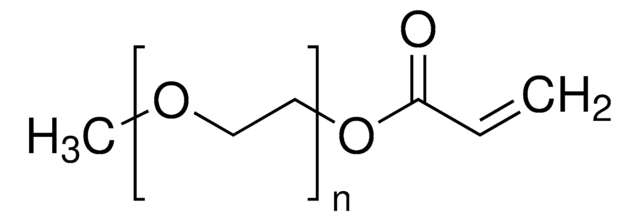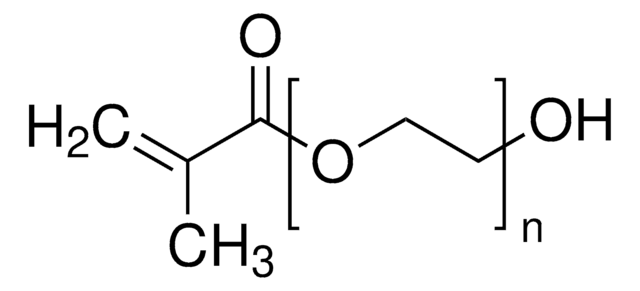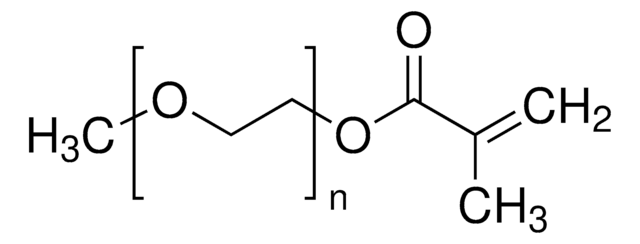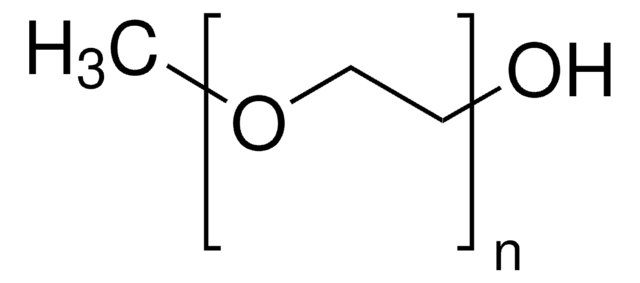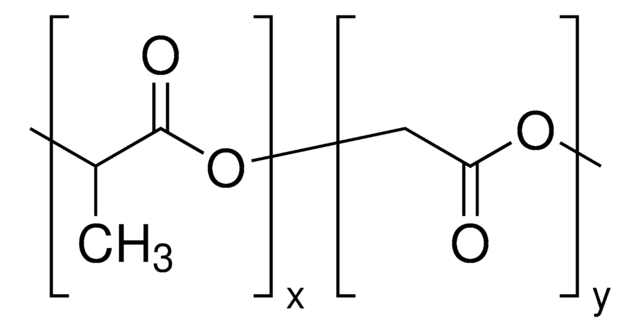730270
Poly(ethylene glycol) methyl ether acrylate
average Mn 2,000, acrylate, methoxy, MEHQ as inhibitor, chemical modification reagent polymerization reactions
Sinonimo/i:
Polyethylene glycol, Acryl-PEG, Methoxy PEG acrylate, Methoxy poly(ethylene glycol) monoacrylate, Poly(ethylene glycol) monomethyl ether monoacrylate, mPEG-acrylate
About This Item
Prodotti consigliati
product name
Poly(ethylene glycol) methyl ether acrylate, average Mn 2,000, contains MEHQ as inhibitor
Forma fisica
solid
PM
average Mn 2,000
contiene
MEHQ as inhibitor
Impiego in reazioni chimiche
reagent type: chemical modification reagent
reaction type: Polymerization Reactions
Temp. transizione
Tm 49-54 °C
Densità
1.09 g/mL at 25 °C (lit.)
Mw/Mn
<1.1
Estremità Ω
acrylate
Estremità α
methoxy
Architettura del polimero
shape: linear
functionality: monofunctional
Temperatura di conservazione
−20°C
Cerchi prodotti simili? Visita Guida al confronto tra prodotti
Nota sulla preparazione
Codice della classe di stoccaggio
11 - Combustible Solids
Classe di pericolosità dell'acqua (WGK)
WGK 3
Scegli una delle versioni più recenti:
Certificati d'analisi (COA)
Non trovi la versione di tuo interesse?
Se hai bisogno di una versione specifica, puoi cercare il certificato tramite il numero di lotto.
Possiedi già questo prodotto?
I documenti relativi ai prodotti acquistati recentemente sono disponibili nell’Archivio dei documenti.
I clienti hanno visto anche
Articoli
Fouling Resistant Biomimetic Poly(Ethylene Glycol) Based Grafted Polymer Coatings
Progress in biotechnology fields such as tissue engineering and drug delivery is accompanied by an increasing demand for diverse functional biomaterials. One class of biomaterials that has been the subject of intense research interest is hydrogels, because they closely mimic the natural environment of cells, both chemically and physically and therefore can be used as support to grow cells. This article specifically discusses poly(ethylene glycol) (PEG) hydrogels, which are good for biological applications because they do not generally elicit an immune response. PEGs offer a readily available, easy to modify polymer for widespread use in hydrogel fabrication, including 2D and 3D scaffold for tissue culture. The degradable linkages also enable a variety of applications for release of therapeutic agents.
Devising biomaterial scaffolds that are capable of recapitulating critical aspects of the complex extracellular nature of living tissues in a threedimensional (3D) fashion is a challenging requirement in the field of tissue engineering and regenerative medicine.
Il team dei nostri ricercatori vanta grande esperienza in tutte le aree della ricerca quali Life Science, scienza dei materiali, sintesi chimica, cromatografia, discipline analitiche, ecc..
Contatta l'Assistenza Tecnica.